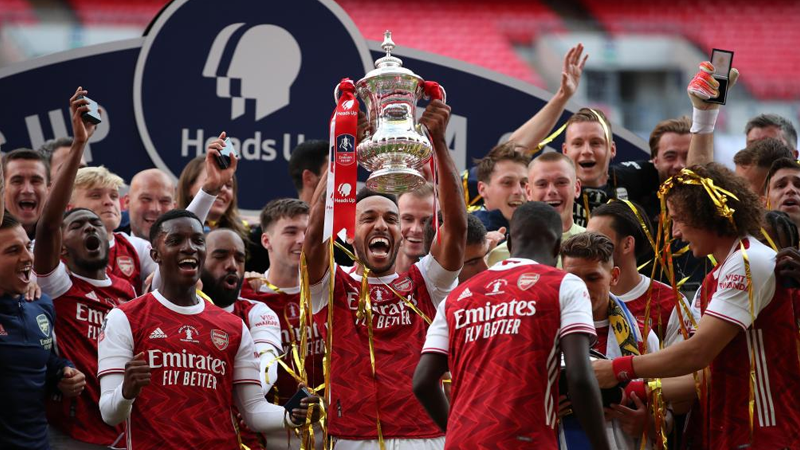Recently, Arsene Wenger, the former Arsenal FC manager, released his autobiography “My Life in Red and White”, a tale of his stewardship as the Club’s Manager for 22 years.
A quick thumbing-through of the book will reveal to the reader a sense of the financial hardship the club had to deal with for years. This financial challenge gave the club little wiggle room and that, to a large extent, explains the Club’s lackluster performance in terms of winning football trophies, among other things.
On the 9th of August 2006, Arsenal FC inaugurated the Emirates Stadium with the first match of the season played against Aston Villa in the stadium. For years after the inauguration of the Stadium, Arsenal was in deep financial trouble and the main concern of the club was survival.
To pay back the money Arsenal FC owed for the Emirates Stadium, the Club had to qualified for the Champions League three times out of five. They also needed an annual average spectatorship of 54,000 people per match.
The Club qualified for the Champions League 19 times consecutively but their financial situation meant they couldn’t compete with Clubs with deeper pockets in terms of attracting and retaining top Football Talents.
Under Arsene Wenger’s leadership, the team managed to stay consistent in the face of towering odds. As time went by, the Club managed to pay the debts and build some great teams but even at that, the Club still lacked the financial appeal and the service of experienced football players.
The Club had to make do with young players in the absence of the highly invaluable experienced players.
For instance, Cesc Fabregas was 16 years old when he made his debut at Arsenal FC. Jack Wilshere was 16 when he made his debut in the League in 2008.
According to Arsene Wenger, the Club lost more than its fair share of matches because of its young players. A player is not the same and doesn’t offer the same to his team between the age of 16 and 22 as he does between the age of 24 and 28.
Arsenal FC lost several big matches because the other team happened to have grizzled players with better experience.
The Club however had to persevere in the face of hardship so that a club of the future can be built on a healthy financial foundation.
You must have heard lots of Arsenal Fans complain about the Club’s failure to buy top players or about the sale of a player.
In Wenger’s autobiography, one gets a sense of why all of that had to be done. Competing with clubs like Manchester City, Manchester United, and Chelsea, to mention a few, when it comes to buying or selling a player is no child’s play.
According to Wenger, the Club’s budget had to be strictly managed and whenever the club was interested in buying a player, the negotiation had to be tough as they couldn’t afford to make payroll exceed 50% of the Club’s budget.
The only money the Club had available was the money freed up by transfers when the club makes a good sale.
When one considers all the restrictions Arsenal FC had to deal with, the fact that the club managed to often finish in the top four of the English Premier League table is a phenomenal reality.
Even with the Club’s austere measures, The Club still managed to stay effective and competitive.
As a result, one is left wondering what the Club will achieve with the financial resources and flexibility of a Manchester City.
One other challenge that bedeviled Arsenal FC, especially under Wenger’s leadership, was the challenge of terrible injuries. Numerous players, the younger ones especially, experienced some terrible injuries. These injuries permanently put some players out of action while it hindered the career of other players, considerably.
The fact that the club had to give many young players their debut when they were still young and vulnerable, both tactically and physically, largely explains the injuries. And it goes without saying that the injuries adversely affected the Club’s performance in football games.
Despite all the challenges highlighted above, the Club also had to deal with pressure from the media and the Club’s fan base.
The fan base, mostly, couldn’t see what the club was achieving even though the management felt they were doing more with less. This is because the trophies were just nowhere to be found.
A shake up on the Board also affected the Club’s performance. David Dein, the man who hired Arsene Wenger for Arsenal FC, had to leave the board. By wanting to bring Stan Kroenke, a director of Arsenal since 2008, onto the board, David Dein put himself in direct and open conflict with the board.
With David Dein’s departure, the Club experienced some sort of cultural shift as there was a new Russian Oligarch among the shareholders. A man named Alisher Usmanov.
The American Entrepreneur, Stan Kroenke, would later become the majority shareholder after he bought out some other shareholders.
Before the end of 2008, Stan Kroenke had 97% of Arsenal shares and he was effectively in charge. It was at this point that IVAN GAZIDIS was hired to organize the club’s future structure.
At the time, Arsenal was a reflection of what was happening in the world of football; things were evolving, priorities were shifting.
But by bit, clubs were being purchased by foreigners and the Premier League no longer belonged to the English. There was a move from supporter-owners to investor-owners and as you can probably tell, that meant new rules and corporate goals had to be imposed.
All clubs became corporate entities and the human touch began to diminish. In Arsene Wenger’s opinion, when a club gets too big, there’s the risk that it might lose its performance culture. Such corporate entities become about protecting personal interests and the status quo. Innovation suffers as a result.
Wrapping Up
Even though Arsene Wenger was able to keep things from falling apart entirely while he was Arsenal FC manager, the same can’t be said for those who took over from him immediately. However, the Current Manager, Mikel Arteta has begun to turn things around at the Emirates, after what is considered a disappointing start of the season. The Club has secured 4 straight wins in recent weeks.
Meanwhile, in a bid to get a quality creative midfielder, certain players must leave and Mesut Ozil is one of the players the Club plans to ship out.
The Arsenal FC playmaker bid farewell to his teammate at the Club’s London Colney Training Ground ahead of his transfer to the Turkish club, Fenerbahce.









